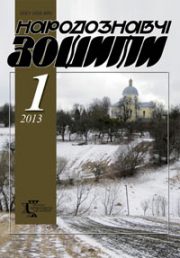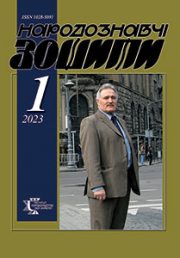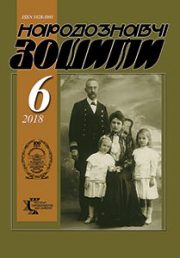The Ethnology Notebooks. 2022. № 2 (164), 294—303
UDK 811.161.2’373’42:[[82-94:39](477.83-21)]:[314.15.045:343.262](430=161.2)”1939/1945″
DOI https://doi.org/10.15407/nz2022.02.294
KUZMENKO Oksana
- ORCID ID: https://orcid.org/0000-0002-0512-6388
- Doctor of Sciences in Philology
- (Ph. D. in Folklore Studies), Senior Scholar,
- The Ethnology Institute of the
- National Academy of Sciences of Ukraine,
- Leading Research Associate
- of the Department of Social Anthropology,
- 15, Svobody Avenue, 79000, Lviv, Ukraine,
- Contacts: е-mail: kuzmenko.oksana@gmail.com
Abstract. The article focuses on oral (auto)biographical narratives about labor slavery in the Third Reich during World War II. The theme of the man of Resistance is considered on the example of modern stories and legends that originate from the local cultural tradition of Yavoriv region (Lviv state). The main focus is on features of stories of Galician employees, in particular the textual analysis of typical stories about responsible manual labor in Germany, helping the starvers, and understanding the justice, which are the object of this study. The conflict of works is based on the antinomies crime — punishment, man — nonhuman, which are manifested through the concepts (help, robbery, deception, escape), which are the subject of research. They are important for the formation of behavioral patterns and building a positive ethnic complementarity of Ukrainians in relation to «foreign» / «other». Therefore, the relevance of the article is due to the need to study the image mechanisms of «man of resistance» (S. Grabovsky), who is guided by the right to choose, as well as ways to verbalize positive survival experience and solidarity of people during the wars.
The purpose of the study — to identify and investigate the elemental protest types of Galician Ostarbeiters, who construct the artistic image of the Ukrainian slave as a man of Resistance. The task — to single out episodes about labor slavery in narratives about the insurgent struggle, to classify stable folklore motifs and concepts that determine the anthropological perspective of the ethnography of war; to identify forms of expression of humane behavior and moral gestures of the heroes; to analyze stories through the prism of the twoness of the characters: journeyman — employer, Ukrainian — Galician — Ukrainian-Ostarbeiter, slave — enslaver.
The scientific novelty of the work consist in the study of folklore ways of representing the memoirs of the working slaves of the Third Reich and stories about them from the perspective of transmitting artistically expressive images and knowledge of solidarity and dignity, which are important for modern society life; as well as the introduction into scientific circulation inaccessible to general public field materials from 1999—2016 years by folklorist Eugene Lunio (1960—2021), which are the main source of the current study.
The methodological basis of the article is a conceptual approach that combines narrative, structural-semantic, historical-typological, biographical methods of studying texts of modern oral narrative tradition on the military-historical subjects.
Keywords: folklore of resistance, oral narrative, plot, motif, concept, World War II, Third Reich, forced laborer, ostarbeiter.
Received 6.05.2022
REFERENCES
- Kuzmenko, O. Something about Ukrainian Folklore from a New Historical Era of the Struggle for Independence. Korean Journal of Ukrainian Studies. 2.04.2022.Retrieved from: https://www.koreanjournalofukrainianstudies.com/post/something-about-ukrainian-folklore-from-a-new-historical-era-of-the-struggle-for-independence (Last accesst: 12.04.2022).
- Shuvalova, I. (2020). Voices of the War in Donbas: Exploring Identities in the Affected Communities Through the Prism of War Songs (Doctoral thesis). Retrieved from: https://www.repository.cam.ac.uk/handle/1810/304292 (Last accesst: 12.12.2021).
- Yavorska, G.M. (2016). «War» Concept: Semantics and Pragmatics. Strategic Priorities. Series: Philosophy, 1 (38), 14—23 [in Ukrainian].
- Lapan, T. (2008). Oral stories of Galician Ostarbeiters: the specifics of forced experience. East — West: historical and cultural collection: Oral history in modern socio-humanitarian studies: theory and practice of research (Issue 11—12, pp. 198—223) [in Ukrainian].
- Galchak, S. (2004). «Eastern workers» from Podillya in the Third Reich: deportation, Nazi hard labor, resistance to the oppressors. Vinnytsia: Book-Vega [in Ukrainian].
- Galchak, S., Pastushenko, T. & Shevchenko, M. (2011). Ukrainian workers in Nazi Germany: recruitment, forced labor, repatriation. In Ukraine in the World War II: a view from the XXI century: historical essays: in 2 vol. (Vol. 2, pp. 49—91). Kyiv: Naukova dumka [in Ukrainian].
- Steblyanko, I.O. Songs (without melodies and with melodies), chastushka, poems recorded at factories and mines of Dnipropetrovsk and Kharkiv regions. About the times of the World War II, songs of German captivity; about Soviet life, love, jokes; household songs. 1943—1947. Archive of the Rylsky Institute of Art Studies, Folklore and Ethnology of the National Academy of Sciences of Ukraine. F. 14—3. Оd. save 12 а. Аrc. 67—123 [in Ukrainian].
- Fukuyama, F., & Sakhno, T. (2020). Identity. The Demand for Dignity and the Politics of Resentment. Kyiv: Naukova dumka [in Ukrainian].
- Burdieu, P., & Meshcherkina, E.Yu. (2002). Biographical illusion. In memory. Interaction. Interview. Interpretation, 1 (1), 75—84 [in Russian].
- Melenchuk, M., Grinchenko, G., Kobchenko, K., & Kis, O. (Eds.). (2015). Experience of forced labor in memory of former forced Ostarbeiters from Canada. In Central and East European Women and the Second World War. Gendered experiences in a time of extreme violence (Pp. 252—266). Kyiv: ART BOOK [in Ukrainian].
- Lunio, Ye. (2019). The most valuable gift for the mother: a family factor in the insurgent family tradition. In From insurgent and camp times. Stories by Melania Sluk and Stefania Susol (Pp. 3—20). Lviv: Raster-7 [in Ukrainian].
- Yermolenko, V. (2020). Liquid ideologies. Ideas and politics in Europe of the XIX—XX centuries. 2 ed. Kyiv: Spirit and Letter [in Ukrainian].
- Lunio, Ye. (2021). The Insurgent Struggle in the Stories of Participants and Eyewitnesses (Vol. 3). Lviv; Drogobych: Kolo [in Ukrainian].
- Lunio, Ye. (2005). Yavoriv Region in the Insurgent Struggle. Stories of Participants and Eyewitnesses (Vol. 1). Lviv [in Ukrainian].
- Lunio, Ye. (2015). Yavoriv Region in the Insurgent Struggle. Stories of Participants and Eyewitnesses (Vol. 2). Lviv [in Ukrainian].
- Mushketyk, L. (2019). Labor-centric values in Ukranian folklore tradition. The Ethnology Notebooks, 4, 823—832 [in Ukrainian].
- Myshanych, S. (1983) (Ed.). Folk Stories. Kyiv: Naukova dumka [in Ukrainian].
- Grytsa, S.Y., Marchenko, M.G., & Dei, O.I. (Ed.). (1975). Mercenary and labor songs. Kyiv: Naukova dumka [in Ukrainian].
- Kuzmenko, O. (2018). Dramatic human existence in Ukrainian folklore: conceptual forms of expression (the period of WWI and WWII). Lviv: Institute of Ethnology of the National Academy of Sciences of Ukraine [in Ukrainian].
- Ioannidy, A.L., & Dei, O.I. (Ed.). (1985). Legends and traditional stories. Kyiv: Naukova dumka [in Ukrainian].






